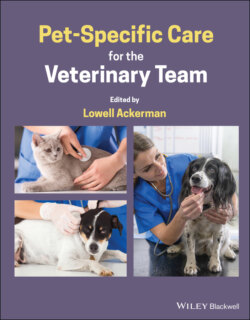Читать книгу Pet-Specific Care for the Veterinary Team - Группа авторов - Страница 363
EXAMPLES
ОглавлениеHere are samples of healthcare programs for two different breeds. For each item marked as needing client education, you would need to have or develop a handout or other tool to use with clients. Items in bold would become part of your screening or preventative program at the appropriate age.
Healthcare considerations for a Doberman pinscher
| System | Recommendation |
| Behavior | Males may be aggressive; prone to flank sucking, lick granulomas |
| Cardiac | Dilated cardiomyopathy (DCM) very common – annual ECG screen to look for ventricular premature contractions (VPCs), consider annual echocardiogram/Pro‐BNP, client education, recommend pet health insurance when young |
| Dermatological | Seasonal flank alopecia; lick granulomas; pemphigus; zinc‐responsive dermatosis |
| Drug reactions | Avoid sulfa drugs which can increase risk for keratoconjunctivitis sicca (KCS) and adverse drug reactions |
| Gastrointestinal | Prone to foreign body, bloat. Client education. Consider gastropexy during neutering surgery. Recommend pet health insurance when young |
| Hemolymphatic | von Willebrand disease very common in breed. Screen for clotting ability (DNA test, buccal bleeding time or von Willebrand factor) before surgery or dental extractions. Recommend pet health insurance |
| Chronic active hepatitis | Periodic liver function testing |
| Hypothyroidism | Periodic thyroid profiles, starting with baseline at 1 year of age |
| Neurological | Intervertebral disc disease (cervical), Wobbler's, narcolepsy. Client education |
| Ophthalmic | Cataracts, progressive retinal atrophy – appropriate screening |
| Orthopedic | Hip dysplasia, anterior cruciate ligament tear. Client education, recommend pet health insurance |
| Infectious diseases | Potentially increased susceptibility to parvovirus vaccination. Consider vaccination booster at 5 months of age; titers |
| Urology | Glomerulonephropathy (GN) – consider annual urine protein:creatinine ratio |
Healthcare considerations for a Boston terrier
| Dentistry | Periodontal disease – frequent dental cleanings, client education; failure of canine teeth to erupt – check dentition at 5–6 months of age |
| Dermatological | Alopecia, atopic dermatitis (hyperadrenocorticism) – client education; demodicosis more common – skin scrape early if clinical presentation consistent |
| Reproductive | Dystocia can be an issue – client education if breeding |
| Gastroenterological | Pyloric stenosis more common |
| Neoplastic | Mast cell tumor (MCT), melanoma – fine needle aspirate (FNA)/remove all lumps |
| Neurological | Hydrocephalus – check for open fontanelles in puppies, monitor behavior |
| Ophthalmological | Prolapse of nictitating membrane (cherry eye), corneal ulcers, pigmentary keratitis, corneal dystrophy – client education; cataracts – both juvenile and late onset; iris cysts; vitreal syneresis > glaucoma and cataracts; proptosis |
| Keratoconjunctivitis sicca | Schirmer tear test routinely |
| Respiratory | Respiratory dysplasia, including hypoplastic trachea – client education, early surgery if needed, give estimate for soft palate surgery with spay/neuter estimate. Skilled individual to intubate at every age, to look for elongated soft palate |
